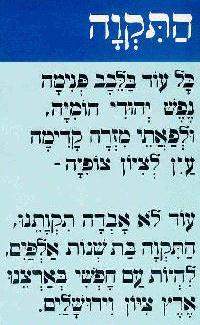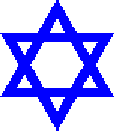HaTikvaIn The Jewish heart
|

|
The title of the Israeli national anthem is HATIKVA, which means "The Hope." Hatikva is about "hope," the undying hope of the Jewish people, through the long years of exile, that they would someday return to independence in their homeland.
During the two thousand years of exile, the Jewish people always kept a heartfelt prayer in their hearts for return to Israel. They said special daily prayers for return and they celebrated the holidays according to Israeli seasons and calendar. This is the message of the Hatikvah's first stanza.
Zion is another name for Israel and Jerusalem. When the Jewish people pray their eyes, hearts and prayers are directed toward Israel and Jerusalem. For many long painful years, the land of Israel was in the hands of foreigners. The Jews who lived in Palestine were not free. Yet their hope for freedom and independence never died. The second stanza of the Hatikva recalls the undying hope of Jews through the generation, Jews who lived in other countries and Jews who had remained in Palestine.
When we sing the Hatikva together, we are doing much more than just singing a nice melody. We are making a promise that we will never forget the undying Jewish hope for independence and that we will do all within our power to help the State of Israel prosper.

After being forcibly exiled from their land, the people kept faith with it throughout their Dispersion and never ceased to pray and hope for their return to it and for the restoration in it of their political freedom.
Impelled by this historic and traditional attachment, Jews strove in every successive generation to re-establish themselves in their ancient homeland. In recent decades they returned in their masses. Pioneers, ma'pilim (immigrants coming to Eretz-Israel in defiance of restrictive legislation) and defenders, they made deserts bloom, revived the Hebrew language, built villages and towns, and created a thriving community controlling its own economy and culture, loving peace but knowing how to defend itself, bringing the blessings of progress to all the country's inhabitants, and aspiring towards independent nationhood.
The catastrophe which recently befell the Jewish people - the massacre of millions of Jews in Europe - was another clear demonstration of the urgency of solving the problem of its homelessness by re-establishing in Eretz-Israel the Jewish State, which would open the gates of the homeland wide to every Jew and confer upon the Jewish people the status of a fully privileged member of the community of nations.
This right is the natural right of the Jewish people to be masters of their own fate, like all other nations, in their own sovereign State.

WE DECLARE that, with effect from the moment of the termination of the Mandate being tonight, the eve of Sabbath, the 6th Iyar, 5708 (15th May, 1948), until the establishment of the elected, regular authorities of the State in accordance with the Constitution which shall be adopted by the Elected Constituent Assembly not later than the 1st October 1948, the People's Council shall act as a Provisional Council of State, and its executive organ, the People's Administration, shall be the Provisional Government of the Jewish State, to be called "Israel".


WE APPEAL to the Jewish people throughout the Diaspora to rally round the Jews of Eretz-Israel in the tasks of immigration and upbuilding and to stand by them in the great struggle for the realization of the age-old dream - the redemption of Israel.
PLACING OUR TRUST IN THE ALMIGHTY, WE AFFIX OUR SIGNATURES TO THIS PROCLAMATION AT THIS SESSION OF THE PROVISIONAL COUNCIL OF STATE, ON THE SOIL OF THE HOMELAND, IN THE CITY OF TEL-AVIV, ON THIS SABBATH EVE, THE 5TH DAY OF IYAR, 5708 (14TH MAY,1948).
Aliyah means immigration of Jews, and oleh (plural: olim) means a Jew immigrating to Israel.
The Law of Return was passed by the Knesset on the 20th Tammuz, 5710 (5th July, 1950).
 In 1948, after nearly two thousand years of exile, the State of Israel was reestablished as the Jewish homeland. The new Israeli flag of the modern state has been a symbol of the proud return of the Jewish Nation to its homeland.
In 1948, after nearly two thousand years of exile, the State of Israel was reestablished as the Jewish homeland. The new Israeli flag of the modern state has been a symbol of the proud return of the Jewish Nation to its homeland.
The zionist leaders saw in the talith, the traditional Jewish prayer shawl, the flag of the Jewish Nation. The blue and white talith with which the Jews wrap themselves when they pray: that is the Jewish symbol.
This talith was taken from its bag and unrolled before the eyes of Israel and the eyes of all nations. A blue and white flag with the Shield of David painted upon it. That is how the Israeli national flag, that flew over the First Zionist Congress, came into being.
The blue stripes above and below the Magen David remind us of the talith. When we see the Israeli flag, we remember the faith and the prayers of the many generations of Jews who longed for the return to their homeland.
 The Magen David (Shield of David) is a traditional symbol of Judaism. The star is made up of two triangles, one right-side up and the other upside down. One of them points upward toward all that is spiritual and holy. The other one points downward--toward all that is earthly and secular. By leading a life of Torah and mitzvot the Jew strives to bring together the worlds of spiritual and the earthly, the worlds of the holy and the secular.
The Magen David (Shield of David) is a traditional symbol of Judaism. The star is made up of two triangles, one right-side up and the other upside down. One of them points upward toward all that is spiritual and holy. The other one points downward--toward all that is earthly and secular. By leading a life of Torah and mitzvot the Jew strives to bring together the worlds of spiritual and the earthly, the worlds of the holy and the secular.
Legend tells us that King David, the King of Israel, adorned his shield with this six-pointed star, thus the star is named the Magen David.
Copyright © 1995 - 2025 Ahavat Israel. All rights reserved.